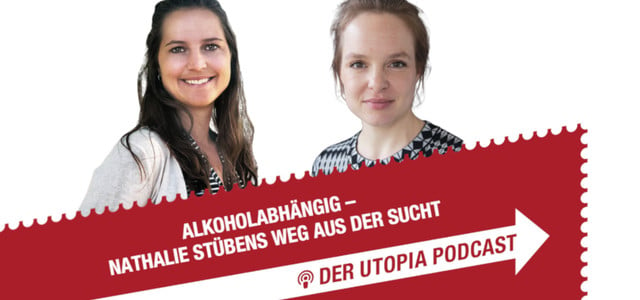
The journalist and entrepreneur Nathalie Stüben was addicted to alcohol for years. In the Utopia podcast she tells how she made her way to an alcohol-free life. She also has tips for parents and friends and reveals why she no longer expects much from health policy.
“When I started drinking, I couldn’t stop.” – This is how Nathalie Stüben describes her alcohol addiction. In the podcast she tells how she faced her illness and freed herself from addiction.
Nathalie Stüben in the Utopia podcast
You can also find the new podcast episode on the following platforms:
- Spotify
- Apple Podcasts
- Castbox
- Deezer
In the podcast episode, Lena and Nathalie also talk about what a better health policy could look like, what Nathalie advises parents to do about alcohol education and why she is no longer ashamed of her addiction today. You can read an excerpt from the conversation below.
Excerpt from the episode
Lena: You also say alcohol is our blind spot in society. What exactly do you think the problem is?
Nathalie: “The biggest problem is that many, I would almost say most, don’t see alcohol as a drug, but rather as a luxury food, sometimes even as food. […] But of course it’s a drug. A substance that changes the way we think and feel is a drug by definition.
However, our political framework also contributes to the fact that we perceive this drug as something completely harmless. We can buy this legally, 24 hours a day, in supermarkets, at gas stations. At gas stations! You have to think about it, people drive there to get gas and then you can buy alcohol there in the middle of the night.
It can be marketed very, very heavily. We see alcohol advertising everywhere, it’s very cheap. In Germany, alcohol is cheaper – in relation to income – than anywhere else in the European Union.
We are totally brought up to drink alcohol and overlook the enormous damage it causes, cover it up and probably suppress it, and that’s why I talk about the blind spot. […]
“I couldn’t imagine living a life without alcohol for a long time.”For a long time I couldn’t imagine living a life without alcohol.
[…] Lena: At some point you admitted that you were addicted to alcohol, but you also say that you didn’t know how exactly you could stop and I also read that you said at the time that the worst thing was the shame. Today you talk very openly about addiction. Is the shame gone?
Nathalie: Yes, it took a while. Charm cannot survive without shining a light on it. If we talk about what is troubling us and others treat us with empathy, then shame cannot survive. […] This worked for me. I started talking about it; first with friends, with my parents, then with my current husband, who I met when I was four months sober and then a few years later in public and today I am no longer ashamed of anything. Because I also understood that it wasn’t my fault.
I was so ashamed because I thought: Wow, I came into this world with so many privileges and I really screwed it up. I was ashamed of that. And today I know that it is a disease. I mean, don’t be ashamed if I have cancer. […] The fact that people in an environment like that in Germany get a problem with alcohol is so common, it’s so normal and I’ve now understood that and that’s why I’m no longer ashamed.
Further links on the subject of alcohol and alcohol abstinence
- Sober Curiosity: The new joy of being sober
- “Provides initial warnings” about when you are drinking too much alcohol
- Carcinogenic foods: 5 products you should be careful about
- Drink less alcohol: What tips will help you
- Self-experiment “Dry January”: Non-alcoholic beer was a revelation
- This is how your body reacts to 4 weeks without alcohol
- Non-alcoholic beer is booming: a healthy thirst quencher or a high-calorie sugar trap?
- Non-alcoholic sparkling wine at Öko-Test: Well-known brands only in the middle range
- Non-alcoholic cocktails: unusual recipes for every taste
You might also be interested in these podcast episodes
- Prof. Dr. Ruckriegel on happiness: “It’s about time.”
- Podcast: Cell phone fasting on your own – addiction therapist gives tips
- Podcast: Eating everyone healthy and sustainably? This is how it could work
This is how you find the Utopia podcast
You can find all previous episodes and more details on how and where you can listen to our podcast on the page The Utopia Podcast – Your Podcast for Sustainability
If you have feedback or topic ideas for us, please send us an email with the subject “Podcast” to podcast@utopia.de.
Read more on Techzle\.com:
- Christmas and loneliness: 24 tips on how you can easily make others happy
- “Nutrition directly influences the health of our brain”: How food affects the psyche
- Dubai chocolate: enjoyment with a bitter aftertaste
** marked with ** or orange underlined Links to sources of supply are partly partner links: If you buy here, you are actively supporting Techzle\.com, because we then receive a small part of the sales proceeds. More info.